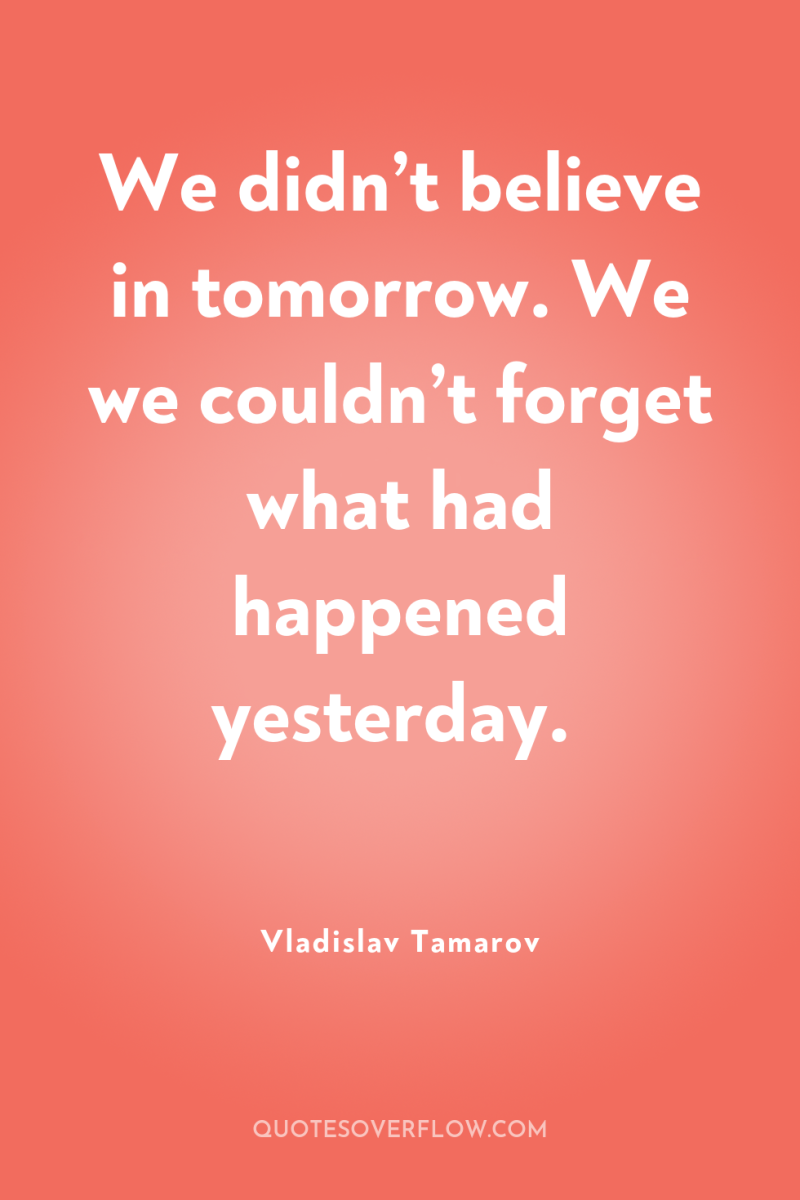
1
We didn’t believe in tomorrow. We we couldn’t forget what had happened yesterday.Vladislav Tamarov
2
I am asked if I think the war was a just war ... how can I answer? I was a boy born and raised in beautiful Leningrad, a boy who loved his parents and went obediently to school. A boy who was yanked out of that life and dumped in a strange land where life followed different rules.Vladislav Tamarov
3
The photos I took in Afghanistan are lying in front of me. I peer into the faces of those who were with me there and who are so far away from me now, into the faces of those who were dying right next to me and those who were hiding behind my back. I can make these photos larger or smaller, darker or lighter. But what I can't do is bring back those who are gone forever.Vladislav Tamarov
4
When I was drafted into the army in April 1984, I was a nineteen-year-old boy. The club where they took us was a distribution centre. Officers came there from various military units and picked out the soldiers they wanted. My fate was decided in one minute. A young officer came up to me and asked, “Do you want to serve in the commandos, the Blue Berets?” Of course I agreed. Two hours later I was on a plane to Uzbekistan (a Soviet republic in Central Asia), where our training base was located. During the flight, I learned most of the soldiers from this base were sent to Afghanistan. I wasn’t scared. I wasn’t surprised. At that point I didn’t care anymore because I understood that it is impossible to change anything. ‘To serve in the Soviet army is the honourable duty of Soviet citizens” — as it’s written in our Constitution. And no one gives a damn whether you want to fulfil this “honourable duty” or not. But then I didn’t know anything about Afghanistan. Up until 1985, in the press and on television, they told us that Soviet soldiers in Afghanistan were planting trees and building schools and hospitals. And only a few knew that more and more cemeteries were being filled with the graves of eighteen- to twenty-year-old boys. Without the dates of their death, without inscriptions. Only their names on black stone …At the base we were trained and taught to shoot. We were told that we were being sent to Afghanistan not to plant trees. And as to building schools, we simply wouldn’t have the time …Three and a half months later, my plane was landing in Kabul, the capital of Afghanistan … We were taken to a club on base. A few minutes later, officers started to come by and choose soldiers. Suddenly, an officer with a smiling face and sad eyes burst in noisily. He looked us over with an appraising glance and pointed his finger at me: “Ah ha! I see a minesweeper! ” That’s how I became a minesweeper. Ten days later, I went on my first combat mission.Vladislav Tamarov
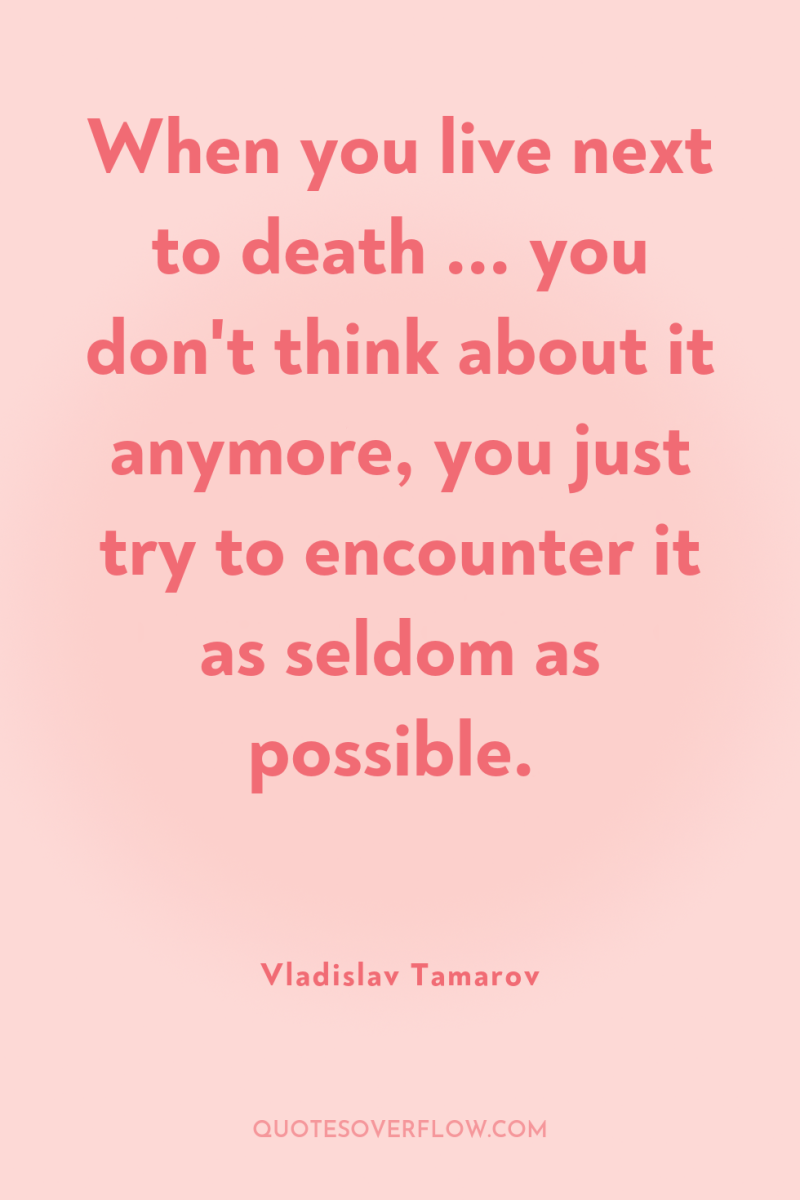
5
When you live next to death ... you don't think about it anymore, you just try to encounter it as seldom as possible.Vladislav Tamarov
6
In forty minutes, people will be shooting at these 19 year old boys. And they will shoot back, and they will kill. That is the law of war: if you don’t kill first, they’ll kill you. We didn’t invent this law. But having landed in a war, we have to live by its rules. And the quicker you learn the rules, the longer you have to live by them. You don’t think about whether you are defending someone’s revolution or defending the ‘southern borders of the motherland’. You simply shoot at those who are shooting at you and at your friend behind you — you shoot at the guys whose mines blew away your friend yesterday.Vladislav Tamarov
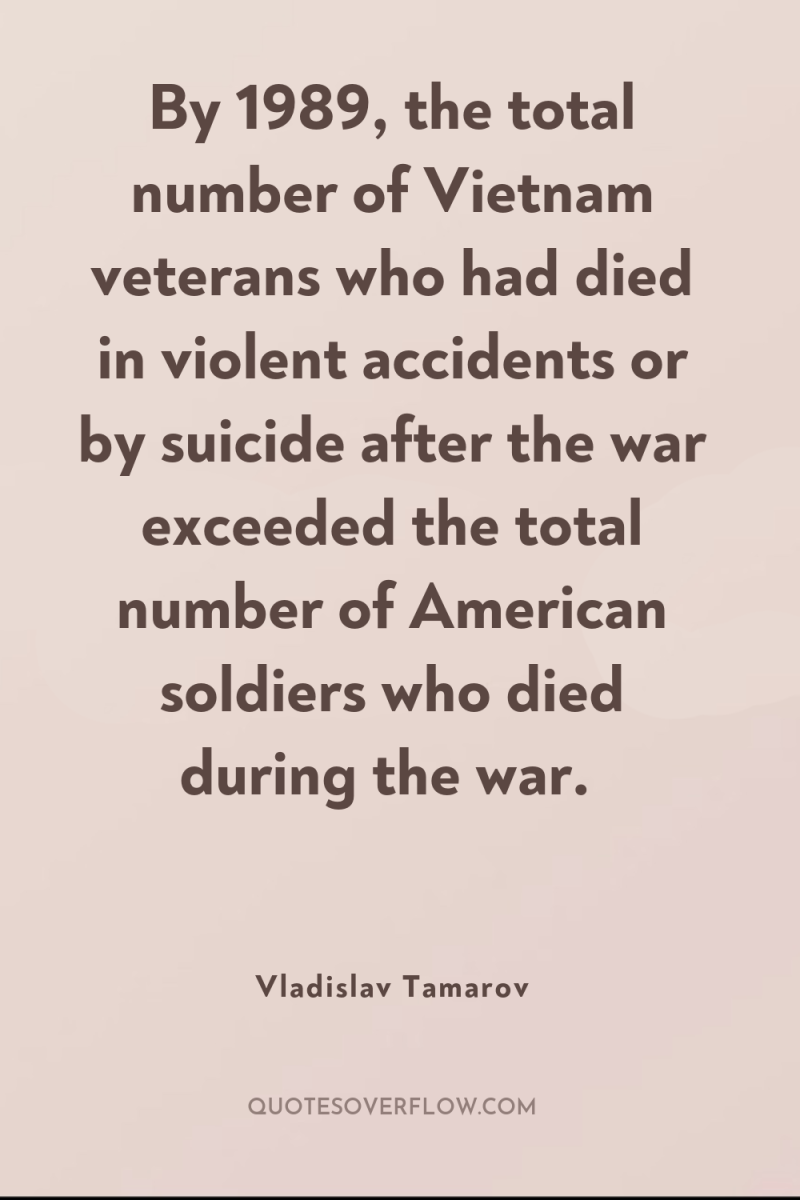
7
By 1989, the total number of Vietnam veterans who had died in violent accidents or by suicide after the war exceeded the total number of American soldiers who died during the war.Vladislav Tamarov
8
He was holding his right leg, but the blood soaked through his fingers and flowed over his hand onto his sleeve. Intuition had served me again this time: my kick had knocked his automatic out of his grasp a fraction of a second before he could press the trigger. The second kick was to his face. It sent him flying about six feet. I set my sights on his head, but something stopped me, one of our guys let out a yelp behind me. Another bullet whistled by right next to me. Apparently, this Mujahadeen was not the only one here. Again, I aimed at his head, but something again stopped me. I saw how his hands were trembling. I noticed the horror in his eyes. 'He is only a boy! ' I thought and pressed the trigger.Vladislav Tamarov
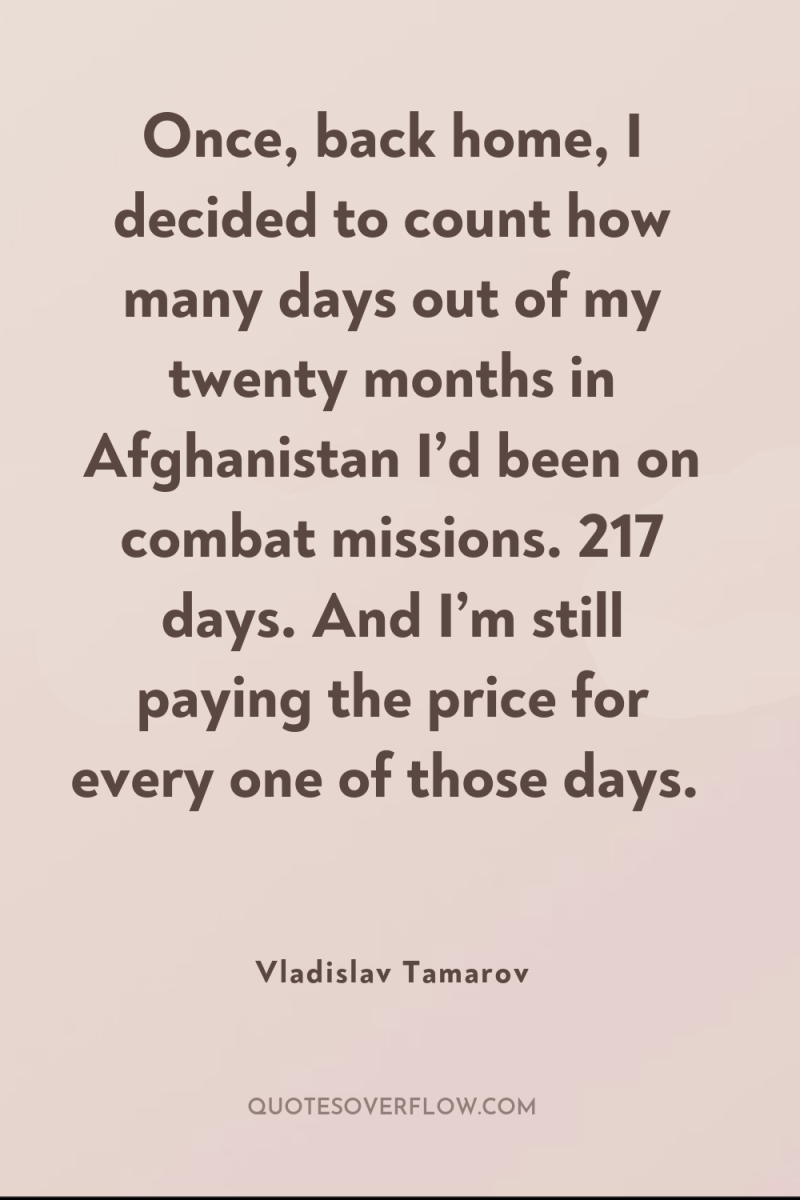
9
Once, back home, I decided to count how many days out of my twenty months in Afghanistan I’d been on combat missions. 217 days. And I’m still paying the price for every one of those days.Vladislav Tamarov
10
We stayed here for only a few hours. We rested and went on. But the camera snatched this fraction of a second from the eternal flow of time and froze it forever. At this moment we didn’t know that in a few hours we would fall into an ambush. At this moment, while we were filling our canteens from the stream, we didn’t yet know that we would stay in the mountains for three days without a drop of water. We didn’t yet know anything … .Vladislav Tamarov
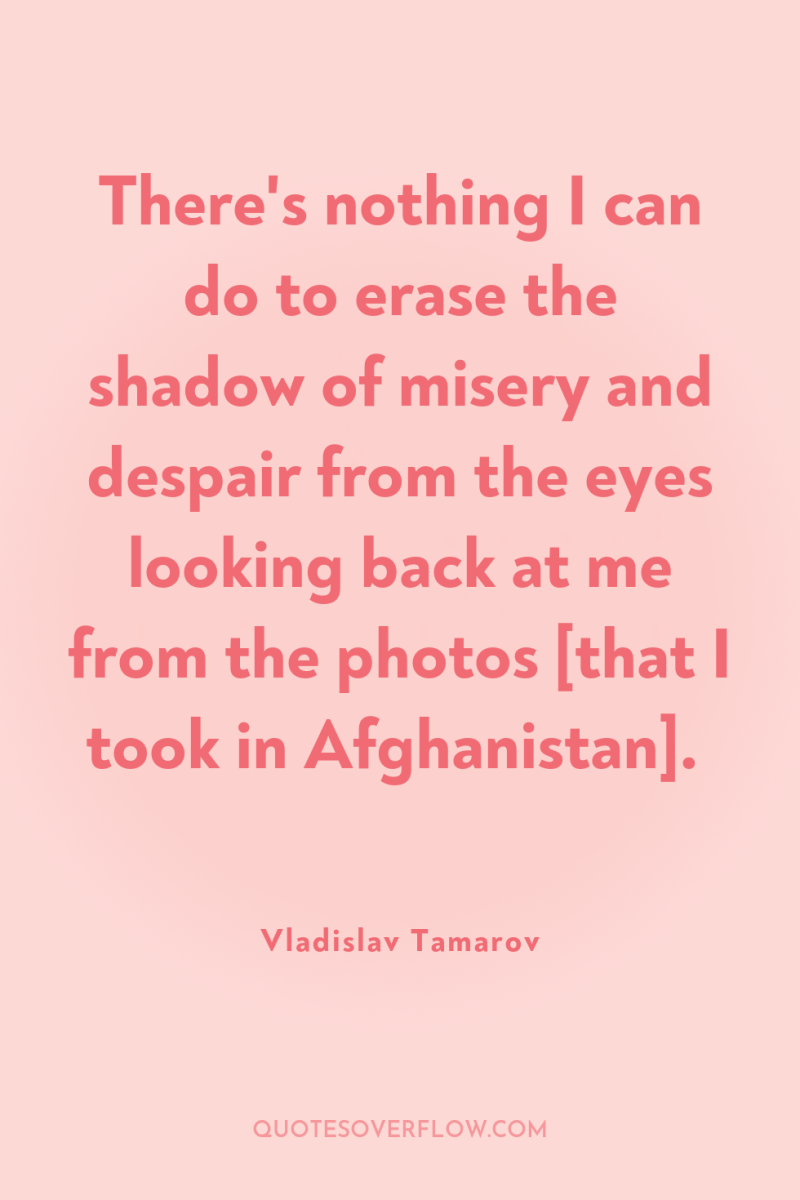
11
There's nothing I can do to erase the shadow of misery and despair from the eyes looking back at me from the photos [that I took in Afghanistan].Vladislav Tamarov
12
When I came home, I was asked to put my pictures in a photo exhibit at the Cinematography College ... my pictures won first prize. I began to ask myself what I was doing, and why. A few months after the exhibit, I dropped out of college, left my wife and began to write this book.Vladislav Tamarov
![[On one of his comrades depicted in the book:]](https://cdn.quotesoverflow.com/file/quotesoverflow/images/on-one-of-his-comrades-depicted337469577691-1200.webp)
13
[On one of his comrades depicted in the book:]" Sasha was my friend … Like me, he was 19. But he didn't come home. He was killed 12 hours after this photo was taken.Vladislav Tamarov
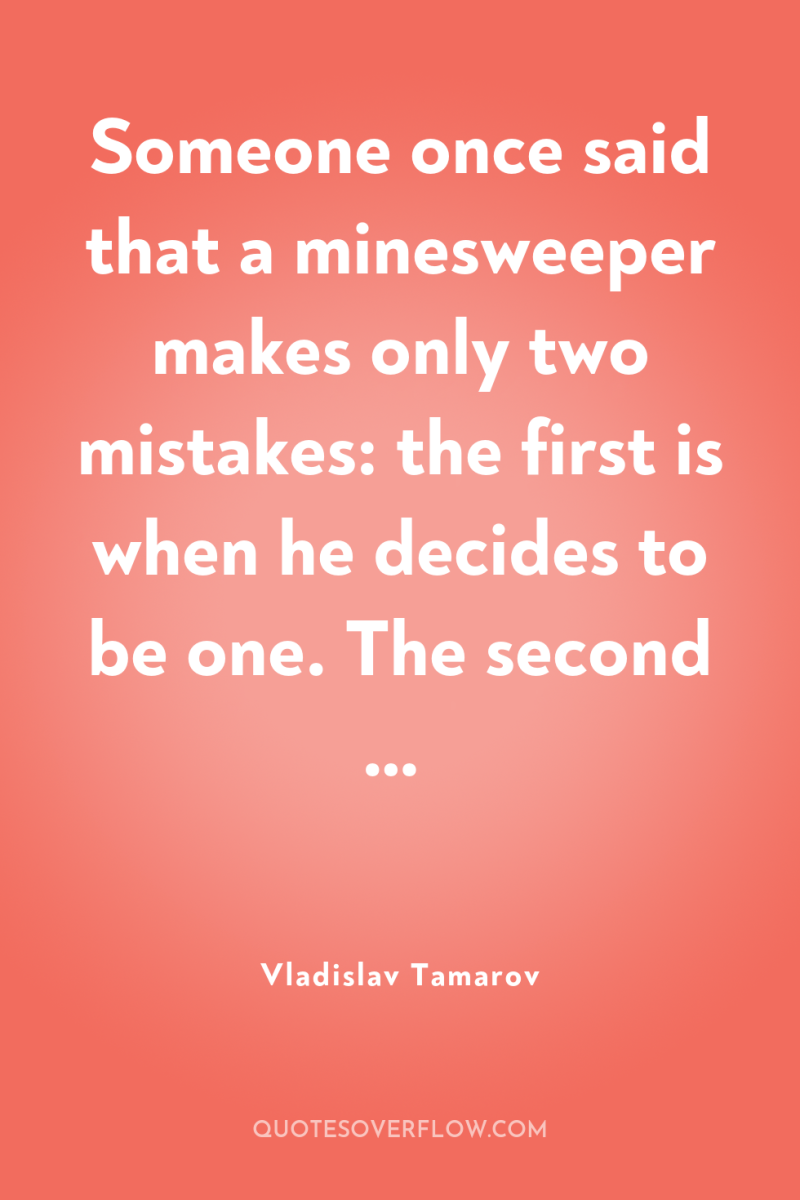
14
Someone once said that a minesweeper makes only two mistakes: the first is when he decides to be one. The second …Vladislav Tamarov
15
On August 10, 1984, my plane landed in Kabul, the capital of Afghanistan. There were no skyscrapers here. The blue domes of the mosques and the faded mountains were the only things rising above the adobe duvals (the houses). The mosques came alive in the evening with multivoiced wailing: the mullahs were calling the faithful to evening prayer. It was such an unusual spectacle that, in the beginning, I used to leave the barracks to listen — the same way that, in Russia, on spring nights, people go outside to listen to the nightingales sing. For me, a nineteen-year-old boy who had lived his whole life in Leningrad, everything about Kabul was exotic: enormous skies — uncommonly starry — occasionally punctured by the blazing lines of tracers. And spread out before you, the mysterious Asian capital where strange people were bustling about like ants on an anthill: bearded men, faces darkend by the sun, in solid-colored wide cotton trousers and long shirts. Their modern jackets, worn over those outfits, looked completely unnatural. And women, hidden under plain dull garments that covered them from head to toe: only their hands visible, holding bulging shopping bags, and their feet, in worn-out shoes or sneakers, sticking out from under the hems. And somewhere between this odd city and the deep black southern sky, the wailing, beautifully incomprehensible songs of the mullahs. The sounds didn't contradict each other, but rather, in a polyphonic echo, melted away among the narrow streets. The only thing missing was Scheherazade with her tales of A Thousand and One Arabian Nights .. A few days later I saw my first missile attack on Kabul. This country was at war.Vladislav Tamarov